 |
HNA, Terko and Wieland special purpose plugs and sockets |
other specials |
| HNA and Terko
sockets are used in local networks, separated
from a standard network sockets. Examples are powering electronic data
processing systems via a circuit that is protected against
voltage spikes, situations in
which interchanging live and neutral poles has to be avoided, or local
networks with a different voltage or
frequency. Special, polarized connectors, made by Wieland, are shown at the bottom of page. |
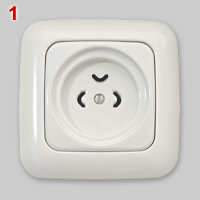 |
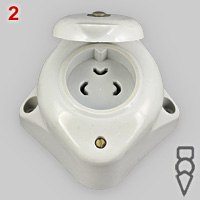 |
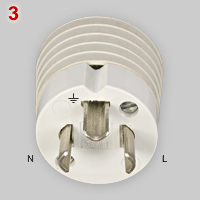 |
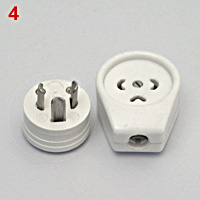 |
| 1 - 4 | Terko type socket, rated at 16A-250V. Terko is a trademark of Busch-Jaeger Electro GmbH (Lüdenscheid, Germany). There are two variants, sockets with a notch near the eath contact (no. 2) and without notch (nos. 1 and 4). Each of the models in the colection that have a notch have a certain degree of protection against dust and water ingression and are more suitable for use in rough and outdoor conditions. However, the 'notch issue' is not documented in Busch-Jaeger catalogs. Terko system dates back to the early 1950s. {ES} - nos 1 and 4; {WN} - nos. 2 and 3 |
| The HNA system is a German type of
special
plugs and sockets that exist already more tha a century. HNA stands for Handelsschiff-Normen-Ausschuss (cargo vessel standard committee). This German shipbuilding standard dates back to 1917. The Marine-Normalien-Kommission, the navy counterpart, was established a year later. HNA plugs and connectors are strongly made and virtually indestructible, ideal for harsh demands on board. Nowadays they are among others used on ships that carry reefer container. A domestic version of HNA plugs and sockets have been used from early 1930s until 2010s. See nos. 5-7 below. |
 |
 |
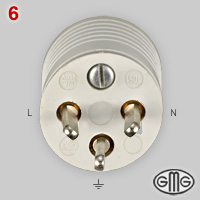
|
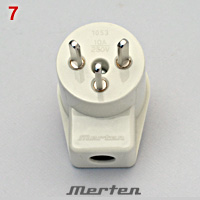
|
| 5a, b 6, 7 |
HNA
domestic type
sockets and plugs, rated at 10A - 250V. Socket no. 5a has been made by Merten (Gummersbach, Germany). GIRA (Radevormwald, Germany) made the recessed socket no. 5b. An additional safety feature is the protruding position of the earth contact to make sure that earth contact is made first (green arrow). Plug no. 6 has the older Gebrüder Merten (GMG) logo, while nos 5a and 7 show the full name of the company. Merten 2015 catalog doesn't mention HNA material anymore. A 1930s HNA plug, made by Dr. Deisting (Kierspe, Germany) is shown on a page about classic uncommon plugs (see no. 15). |
| note |
The domestic HNA variant has flat pins (2.5 x 4.8 mm). Maritime version
(no. 10) has round pins. Domestic plugs have flat, rather than round
pins because a KPI
1928
regulation states that "Earthed sockets are not allowed to accept
unearthed plugs".
A socket with relative narrow, flat
slots cannot be used with unearthed plugs with round 4 mm pins. Maritime and domestic HNA plugs have the same pin configuration: 19 mm L - N spacing and 10 mm earth pin offset. |
 |
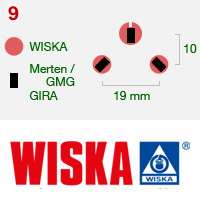 |
 |
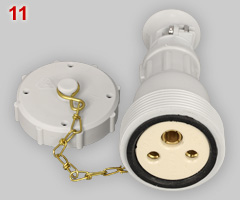 |
 |
|
| 8 - 12 |
Maritime
HNA plug and connector, with round pins. Diameter is 6.0 mm for power
pins and 7.5 mm for the earth pin. Plug and socket are protected
against
dust and water ingression according to IP56 level. Image no. 9 shows
that despite a difference in pin size domestic HNA plugs (GMG, no. 6)
fit in
marine outlets (WISKA, no. 11). There are two marine versions, [v.1]: 10A (DC) /16A (AC) - 150V and [v.2]: 10A (DC) / 16A (AC) - 250V. Pins have a groove and contact tubes have a pin. Position of groove and pin differ for 150 and 250 Volt. The shown plug and connector are 250V models; groove and pin are indicated with green arrows in image no. 12. The lower voltage version has groove and pin at the opposite side. HNA standard is laid down in DIN 89267 version 1 (150 Volt) and version 2 (250 Volt). Plug and connector have been donated to the museum by WISKA Hoppmann & Mulsov GmbH in Kaltenkirchen (north of Hamburg, Germany). |
| Plug comparable to HNA | Domestic HNA plugs closely resemble old
type Israeli plugs with angled flat pins. The page on earthed sockets
with similar
configuration of contacts gives more information. The Czech ČSN 35 4517 type C looks identical to HNA, but is incompatible due to small differences in pin spacing. |
| Wieland connectors for special use |
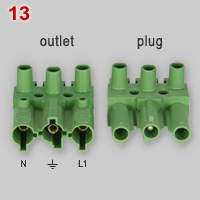 |
 |
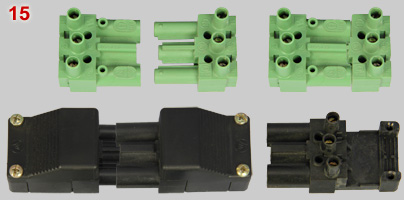 |
| 13, 14 | Male
and female 16A-250V connectors, specially designed for use in cable
ducts, or
installations under raised floors or dropped ceilings. No. 13 is an
older type, which is now replaced by the safer model no. 14. The green
model has been replaced because the contacts of the outlet can be
touched relatively easy with fingers or tools. The black model is
better protected against
direct access. Both models are polarized; L, N and earth poles are
differently shaped, making
exchange of line and neutral impossible. |
| 15 | Top, left: older type connector outlet and
plug facing each other; top,right: connectors fully slided into one
another. Bottom, left: newer type connector partially connected; bottom, right: plug with cap removed. |
 |
Manufacturer of nos. 13-15: Wieland GmbH in Bamberg, Germany. A family-owned company, founded in 1910 by Fritz Wieland. Today it is a worldwide leading manufacturer of pluggable electrical installation technology. |